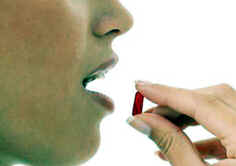Dr. Rashmi Sharma
Self-medication can be defined as obtaining and consuming drugs without the advice of a doctor. There is a lot of public and professional concern about the irrational use of drugs. Even drugs taken on the advise of unqualified practioners/ allopathic drugs by ayurvedic/homeopathic doctors or ayurvedic drugs by allopathic doctors, chemists or quacks also comes under the category of self medication. In developing countries like India, easy availability of a wide range of drugs without doctor’s prescription, along with inadequate health services result in increased proportions of drugs used as self medication compared to prescribed drugs. Although, OTC (over the counter) drugs are legally sold without doctor’s prescription and are of proved efficacy and safety, even then their improper use due to lack of knowledge of their side effects and interactions could have serious implications, especially in extremes of ages (children and old age) and special physiological conditions like pregnancy and lactation. There is always a risk of interaction between active ingredients of hidden preparations of OTC drugs and prescription medicines if user is taking it for some other illness. There is always a hidden risk of worsening of existing disease pathology.
NSAIDS (non-steroidal antiinflammatory drugs), ORS (oral rehydration solution) /antimotility drugs, cough/cold remedies , vitamins, antiacidity drugs, ayurvedic/homeopathic drugs and antibiotics are the commonly used drugs as self medication. Even in developed countries like USA, it has been seen that the misuse of non-prescription (OTC) drugs causes tens of thousands of unnecessary hospitalizations each year. Generally drugs are consumed as self medication for conditions like- joint pains, acid peptic disease, bronchial asthma, obesity, impotence, baldness and female infertility. Moreover, herbs and homeopathic drugs are considered safe and devoid of adverse effects, but the risk of possible drug interactions is always with their use. Alcohol is a drug that interacts with almost every medication, especially antidepressants and other drugs that affect the brain and nervous system. Theophylline, a medication administered to treat asthma, contains xanthines, which are also found in tea, coffee, chocolate, and other sources of caffeine. Consuming large amounts of these substances while taking theophylline increases the risk of drug toxicity. Certain vitamins and minerals impact on medications too. Large amounts of broccoli, spinach, and other green leafy vegetables high in vitamin K, which promotes the formation of blood clots, can counteract the effects of heparin, warfarin, and other drugs given to prevent clotting. Dietary fiber also affects drug absorption. Pectin and other soluble fibers slow down the absorption of acetaminophen (PCM), a popular painkiller. Bran and other insoluble fibers have a similar effect on digoxin, a major heart medication. Ginseng can increase blood pressure. Ginseng, garlic or supplements containing ginger, when taken with the blood-thinning drug, can cause bleeding episodes. Consuming caffeine with ginseng increases the risk of overstimulation and gastrointestinal upset. Long tern use of ginseng may cause menstrual abnormalities and breast tenderness in some women. Ginseng is not recommended for pregnant or lactating women.Garlic capsules combined with diabetes medication can cause a dangerous decrease in blood sugars. Some people who are sensitive to garlic may experience heartburn and flatulence. Goldenseal is used for coughs, stomach upsets, menstrual problems and even arthritis. However, the plant’s active ingredient can raise blood pressure, dangerous electrolyte imbalance in patients with diabetes and kidney disease and is not recommended for pregnant or lactating women.Feverfew, for migraine headaches, should never be taken with Imitrex or other migraine medications. It can result in the patient’s heart rate and blood pressure to rise to dangerous levels.Kava, a herb that has antianxiety, pain relieving, muscle relaxing and anticonvulsant effects, should not be taken together with substances that also act on the central nervous system, such as alcohol, barbiturates, anti depressants, and antipsychotic drugs.
Aspirin can modify the effectiveness of arthritis medications, strong prescription steroids and diuretics. It can cause toxicity when taken with glaucoma and anticonvulsant (anti-seizure) drugs and cause bleeding episodes when combined with a blood thinner, like Coumadin. Heavy drinkers who take acetaminophen for hangover relief risk liver damage. Antacids taken with antibiotics, heart and blood pressure or thyroid medications can decrease drug absorption by up to 90 percent.Antihistamines – Actifed, Benadryl and Comtrex should be avoided if you are taking antianxiety or antidepressant medications. Oral contraceptives are less effective when taken with barbiturates, antibiotics, or tuberculosis drugs. More missuse of antibiotics as self medication is again emerging as a life threatening warfare of superreisistent micobes (bacteria).Self-medication, using non-prescription drugs, could be beneficial to patients, healthcare professionals, the pharmaceutical industry and governments, provided these drugs are used rationally. Apart from community education, safety and efficacy of OTC drugs must be assured, so that these products could be safe even in the event of improper use.
(Author is pharmacologist working as Assistant surgeon Emergency Hospital Vijaypur, Samba-J&K)
Trending Now
E-Paper


